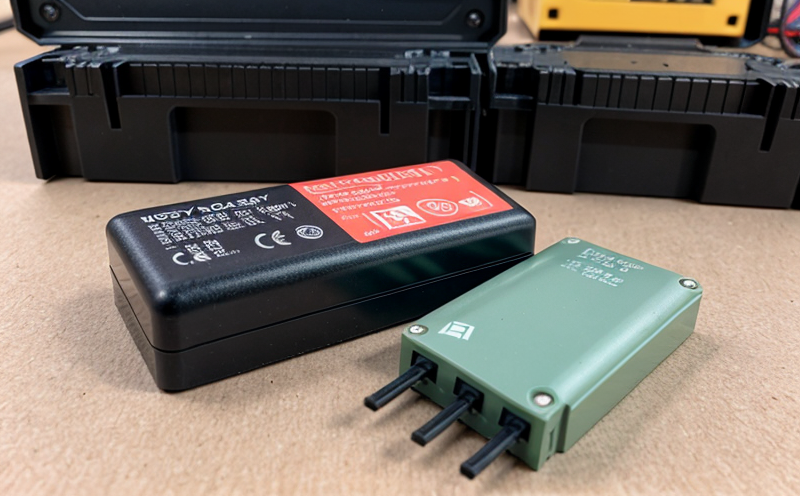SAE J2289 EV Battery Module and Pack Performance Testing
The SAE J2289 standard is designed to evaluate the performance of electric vehicle (EV) battery modules and packs, ensuring they meet stringent safety and operational requirements. This testing ensures that vehicles comply with international standards for energy storage systems, which are critical components in modern EVs.
Our laboratory uses advanced equipment tailored specifically for this standard, providing accurate and reliable test results. The SAE J2289 protocol includes a series of tests aimed at assessing the battery’s ability to withstand various operating conditions, including temperature cycling, high/low voltage testing, and load endurance.
The testing process begins with thorough preparation of the battery module or pack. This involves ensuring that all cells are properly connected and that any necessary adjustments have been made according to the manufacturer's specifications. Once prepared, the battery is subjected to a series of tests designed to simulate real-world driving conditions.
During these tests, we closely monitor parameters such as internal resistance, voltage balance, and state-of-charge (SOC) accuracy. These metrics are crucial for determining whether the battery meets the stringent requirements set forth by SAE J2289. By conducting this testing in a controlled environment, our team can identify any potential issues early on, allowing manufacturers to address them before finalizing their products.
The results of each test are meticulously recorded and analyzed using industry-standard software tools. Our analysts compare these findings against the established criteria outlined in SAE J2289, ensuring that all aspects of the battery’s performance are accounted for. This comprehensive approach guarantees that only compliant batteries enter the market.
Our laboratory has extensive experience working with various types of lithium-ion batteries used in EVs. From small format cells to large packs utilized in commercial vehicles, we have the expertise needed to perform accurate and reliable tests according to SAE J2289 guidelines. Our clients include major automakers as well as suppliers who rely on us for quality assurance.
By partnering with our team, you gain access to state-of-the-art facilities equipped with cutting-edge technology. We pride ourselves on delivering precise results that are essential for maintaining high standards within the EV industry. Whether it's during product development stages or ongoing production processes, SAE J2289 compliance is critical.
| Test Parameter | Description |
|---|---|
| Internal Resistance Measurement | This test measures the resistance within the battery, which helps determine its overall health and efficiency. |
| Voltage Balance Check | The voltage across individual cells is measured to ensure uniformity throughout the module or pack. |
| State-of-Charge Accuracy Test | This test verifies how accurately the battery gauge reflects the actual charge level of the unit. |
| Temperature Cycles | The battery is exposed to extreme temperatures ranging from -20°C to +65°C to simulate real-world conditions. |
Why Choose This Test
- Ensures compliance with international standards for EV battery safety and performance.
- Helps identify potential defects early in the production process, reducing costly recalls later on.
- Promotes consistent quality across all batches of batteries produced by a manufacturer.
The SAE J2289 test is essential for manufacturers who want to ensure their products meet the highest standards before they go into production. By choosing this testing method, companies can demonstrate their commitment to customer satisfaction and regulatory compliance. Additionally, it provides valuable insights during R&D phases, helping engineers refine designs based on empirical data.
For quality managers and procurement teams responsible for sourcing components, selecting batteries that pass SAE J2289 tests signifies reliability and trustworthiness in partners. This choice also aligns with broader sustainability goals by promoting the use of safe and efficient energy storage solutions.
Quality and Reliability Assurance
- Consistent adherence to international standards ensures uniformity across all batches produced.
- Thorough preparation steps ensure that the battery is in optimal condition before testing begins.
The SAE J2289 protocol emphasizes quality and reliability assurance throughout every stage of the testing process. From initial setup to final analysis, our team adheres strictly to prescribed procedures outlined by the standard. This commitment guarantees that each battery tested meets stringent criteria for safety and performance.
By following these guidelines meticulously, we not only ensure compliance but also provide valuable data that can be used during product development cycles or post-production reviews. Our rigorous approach helps build confidence among stakeholders, including OEMs (original equipment manufacturers) and suppliers alike.
Use Cases and Application Examples
- Testing new battery designs during R&D phases to identify areas for improvement.
- Evaluating existing production lines to ensure ongoing compliance with regulatory requirements.
The SAE J2289 test has diverse applications within the EV industry. One common use case is testing newly developed battery modules or packs during research and development (R&D) phases. Engineers utilize this data to fine-tune their designs, ensuring optimal performance before moving forward with larger-scale manufacturing efforts.
Another frequent application involves evaluating existing production lines to maintain consistent quality across all units manufactured. Regular compliance checks help identify any deviations from standard specifications early on, allowing for prompt corrective actions if necessary. This proactive approach ensures that only high-quality batteries reach consumers.
| Use Case | Description |
|---|---|
| New Battery Design Validation | This involves testing prototypes early in the design cycle to validate performance and identify potential issues. |
| Production Line Compliance Checks | Regular tests are conducted on completed modules or packs to ensure they meet all required standards consistently. |





